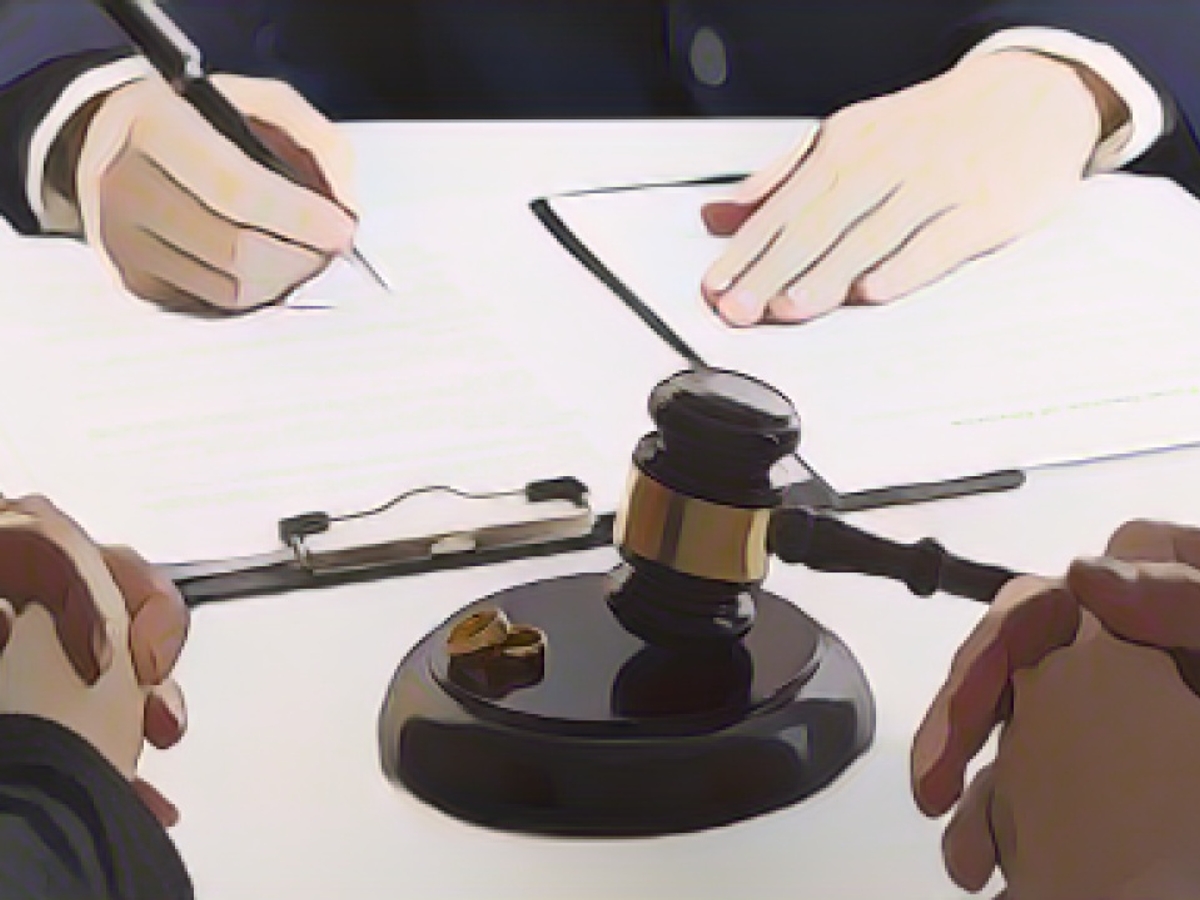Divorce
If you are thinking of getting divorced, there is a lot to sort out. Divorce is a complicated legal process in Germany. Here you can find out everything you need to know about divorce.
What do I need to know?
When can I get a divorce?
You can get a divorce when your marriage has finally broken down. To ensure that no one ends a marriage prematurely, there is a so-called "year of separation" in Germany. This means that you can only get divorced after one year of separation.
However, there are exceptions to this rule:
- If you cannot reasonably be expected to wait this year, your divorce can be finalized sooner. Unreasonable hardship exists, for example, if your spouse has been frequently and demonstrably violent towards you or if you or your partner are expecting a child with another person or if one of you has had an extramarital affair for months.
- If your partner does not want a divorce and can provide good reasons why the marriage has not yet finally broken down, you must have been separated for three years instead of one before a court can divorce you.
You may have to prove that you have actually been separated for one or three years. The year of separation begins as soon as you go your separate ways financially and physically. This means that you separate your accounts and no longer live in the same home or - if this is not possible - at least no longer sleep in the same bed and maintain separate households. If your partner does not agree to the separation, it is advisable to send them a registered letter with your separation request and keep your receipt.
Important: You can apply for divorce shortly before the end of the year(s) of separation, as it usually takes a few months for the court to make a decision.
How can I apply for a divorce?
You must apply for a divorce at the family court in your place of residence or your partner's place of residence. However, you cannot do this yourself, as you must be represented by a lawyer. This means that you have to hire a law firm to file your divorce petition with the court. You can find lawyers in your area via the lawyer search, for example.
It is sufficient for one of you to instruct a law firm to file the application with the court. Your partner will then be informed of the application by the court and can agree or reject it. However, you can also both file an application. In this case, however, you must both instruct a law firm.
What costs can I expect?
Divorce proceedings incur both court costs and legal fees.
The court costs are usually between €450 and €800. This means that you and your partner will each have to pay €225 to €400 to the court.
You will need a law firm to apply to the family court for a divorce. If there are many things to settle between you and you don't agree on everything, lawyers can also help you find the best solution for both of you. If only your partner hires a law firm and you don't have a law firm on your side, you could be at a disadvantage financially or in terms of custody of your joint children.
A divorce lawyer costs an average of €1500 to €2000 for an amicable divorce. If there is a dispute, the costs increase accordingly. When choosing a law firm, make sure that they are familiar with family law and divorce law. It can also be helpful if your law firm is familiar with residence law and international law if your right of residence arose as a result of the marriage.
If you have little or no income, you can apply for legal aid. The state will then cover your legal fees and court costs. You can find out more about this in our chapter"Legal aid".
What needs to be settled in a divorce?
Many things need to be settled in a divorce:
If you do not conclude a prenuptial agreement, the assets generated during the marriage will be divided between the partners in the event of a divorce. This is called"equalization of assets" or "equalization of gains". However, assets that one spouse brought into the marriage are not divided. If you have agreed in a marriage contract that all your assets belong to both spouses (community of property) or that the assets earned during the marriage will not be divided (separation of property), either everything (community of property) or nothing (separation of property) will be divided between the partners. If possible, come to an agreement directly with your partner about a property settlement. If this is not possible, you can apply to the court for a property settlement with the help of your law firm. However, this will increase your legal fees and court costs.
In the event of a divorce and even during the year of separation, the spouses are obliged to support each other. This means that your spouse must pay for your living expenses if you are unable to support yourself. For example, because you are looking after your children or are old, ill, unemployed or in training. Your spouse must also pay maintenance to your children if they live with you. The amount of maintenance you are entitled to depends on your financial circumstances during the marriage. However, it is important to note that your spouse must also have enough money to support themselves. This means that, according to the law, you will not receive maintenance if your partner earns very little money. If you do not receive maintenance and you have no or too little income, you will receive support from the state. If possible, come to an agreement directly with your partner about maintenance payments. If this is not possible, you can apply to the court with the help of your law firm. However, this will increase your legal fees and court costs.
If you have children together, you must decide who the children will live with in the future and whether you will share custody or whether only one of you will have custody. The person who has custody is responsible for the upbringing of the child. They decide, for example, which kindergarten or school the child goes to, who they have contact with and where they live. Access rights mean that the parent with whom the child will not live in the future has the right to see the child regularly. You can reach an out-of-court agreement with your partner on these points. Only if you do not come to an agreement will the court determine a custody and contact arrangement. The best interests of the child are always paramount. If possible, come to a direct agreement on custody and contact rights. If this is not possible, you can apply to the court with the help of your law firm. However, this will increase your legal fees and court costs.
The so-called pension equalization is about your pension entitlements. The longer you have worked and the more you have earned, the higher your pension entitlements will be. Because one of the two partners in a marriage often stays at home and looks after the children, for example, the pension entitlements of one of the two partners are often lower than those of the other. In the event of a divorce, the partner with the higher pension entitlement must therefore hand over part of their entitlement to the other partner. The family court will calculate how high this share is during the divorce proceedings.
Important: If you and your partner do not agree on these points, you can also try mediation instead of settling everything in court. This saves time and money. In mediation, you and your partner try to find a solution to all contentious issues relating to maintenance, custody, etc. with the help of advisors. Only the pension equalization must be determined directly by the court. You can find mediators in your area here.
How does the divorce process work?
First, your law firm must submit the divorce application to the court. The court examines this application and sends it to your partner and asks them for a statement. At the same time, the court will send forms to both of you to calculate your pension entitlements for pension equalization. This calculation can take up to six months. Once everything has been clarified, the court will inform you of a divorce date. Both of you and your lawyers must attend this appointment in person. You must present your ID, your passport and - if available - your family register. If you got married in Germany, you can obtain a copy of your family register from your registry office. The hearing before the family court is not public, which means that no spectators or guests are allowed to be present. The court will resolve all outstanding issues and then officially divorce you. This is called a "divorce decree".
Depending on how long you have been married and how wealthy you are, your divorce proceedings may take different lengths of time. In general, you can expect at least four to six months if you and your spouse agree on all the issues to be resolved and you have neither been married for a long time nor are very wealthy. If there are disputes about assets, maintenance or custody or if you have been married for a long time, the proceedings may take a year or longer.
Can I lose my residence permit as a result of a divorce?
If you have obtained your residence permit through marriage, you may lose your right of residence. For example, if you have come to Germany as part of family reunification and have not applied for family asylum or if you have only obtained your residence permit due to marriage, your right of residence is generally dependent on the continuation of the marriage. The decisive factor here is how long you have been married in Germany: If you were married in Germany for more than three years, your residence permit will be extended for a further year after the divorce. After this year, you can try to obtain an independent right of residence. If you have been married for less than three years, your residence permit will generally not be extended and often even shortened. This means that the immigration authorities can send you a notice to leave the country after the divorce or even after the official separation. You can lodge a complaint against this shortening of your original residence permit. Contact a law firm in good time. You can find lawyers in your area on our Local information page. Enter the city in which you live and search for asylum, right of residence or legal advice.
However, there are also circumstances that allow you to extend your residence permit even after less than three years of marriage:
- If you have a child together and share custody and have regular contact with the child and - if possible - pay maintenance for the child, your residence permit will usually be extended. You can find out more about this in our chapter"Born in Germany".
- If you end the marriage because your partner has repeatedly and demonstrably been violent towards you, your residence permit will usually be extended. You can prove the violence, for example, by filing criminal charges or staying in a women's shelter.
- If you would have to return to a country where you are in danger, your residence permit will usually be extended.
- In some cases, it is also possible to extend your residence permit by taking up qualified employment or training.
Seek advice from an advice center or a law firm. You can find advice centers and lawyers in your area on our Local Information page. Enter the city you live in and search for asylum, right of residence or legal advice. PRO ASYL also offers advice.
What other consequences does a divorce have?
- You can apply to the registry office to use your old surname again in future. However, you may also keep the surname of your former partner.
- As you are now single again, your tax class will change. You can find out more about taxes in our chapter"The German tax system".
What is an annulment of marriage?
The annulment of a marriage is not the same as a divorce. In an annulment, a marriage is ended by a court order because the marriage was not correct. A marriage can be annulled if:
- It was entered into despite a marriage license.
- One of the partners was not legally competent at the time of the marriage.
- One of the partners was not of legal age at the time of the marriage.
- Deception or threats led to the marriage.
- It is a marriage of convenience.
You can find out more about this in our"Marriage" chapter.
Important
Before you separate, you can try to resolve your problems through marriage counseling. However, you will have to pay the costs of the counseling yourself. This is usually around €70-100 per session.
Source: handbookgermany.de








